View in other NatureServe Network Field Guides
NatureServe
Montana
Utah
Wyoming
Idaho
Wisconsin
British Columbia
South Carolina
Yukon
California
New York
American Pinesap - Monotropa hypopithys
Other Names:
Hypopitys monotropa, Monotropa hypopitys
Native Species
Global Rank:
G5
State Rank:
S4
(see State Rank Reason below)
C-value:
Agency Status
USFWS:
USFS:
BLM:
State Rank Reason (see State Rank above)
Monotropa hypopithys occurs in low densities in central and western Montana. It grows in moist, deeply-shaded coniferous forests.
- Details on Status Ranking and Review
Range Extent
ScoreF - 20,000-200,000 sq km (~8,000-80,000 sq mi)
Area of Occupancy
ScoreE - 26-125 4-km2 grid cells
Number of Populations
ScoreC - 21 - 80
Number of Occurrences or Percent Area with Good Viability / Ecological Integrity
ScoreC - Few (4-12) occurrences with excellent or good viability or ecological integrity
Threats
ScoreD - Low
CommentNo known threats.
Intrinsic Vulnerability
ScoreB - Moderately vulnerable
General Description
Achlorophyllous, mycotrophic, firm-fleshy perennial herbs. Stems erect, to 25 cm, simple, yellowish to reddish-orange, aging dark brown. Leaves bract-like, alternate, sessile, ovate-lanceolate, colored as the stem. Inflorescence a crowded, few-flowered, terminal raceme nodding at anthesis, elongating and becoming erect in fruit; pedicels, elongating in fruit. Flowers hypogynous; perianth yellowish; terminal flower 5-merous; those below mostly 4-merous; petals separate, longer than the separate sepals; subtending bracts orange to reddish; stamens 8 or 10; ovary superior. Fruit a subglobose, 4- to 5-chambered capsule (Stickney in
Lesica et al. 2012. Manual of Montana Vascular Plants. BRIT Press. Fort Worth, TX).
Species Range
Montana Range
Range Descriptions
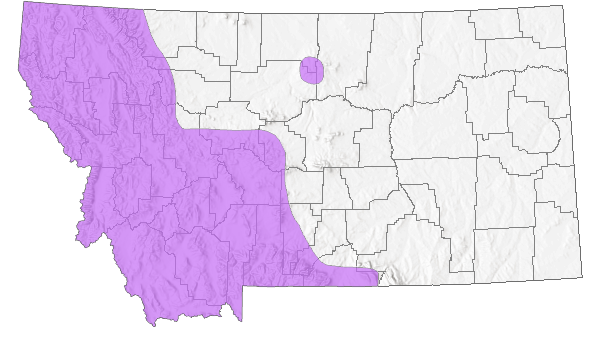
 Native
Native
Range Comments
Common from the piedmont north but known from only a few stations in GA, AL, and FL south of the piedmont. In the Neotropics, found in Mexico and Guatemala, growing in forests of Pinus, Abies, and Quercus at elevations of 1800-4000 m.
Observations in Montana Natural Heritage Program Database
Number of Observations: 73
(Click on the following maps and charts to see full sized version)
Map Help and Descriptions
Relative Density
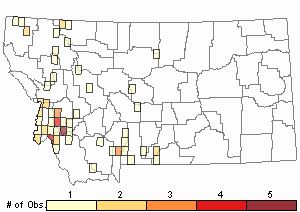
Recency
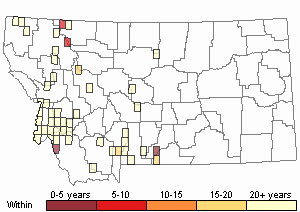

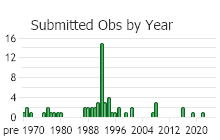
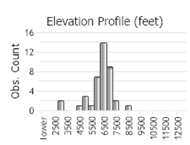 (Observations spanning multiple months or years are excluded from time charts)
(Observations spanning multiple months or years are excluded from time charts)
Habitat
Stewardship Responsibility
References
- Literature Cited AboveLegend:
 View Online Publication
View Online Publication Lesica, P., M.T. Lavin, and P.F. Stickney. 2012. Manual of Montana Vascular Plants. Fort Worth, TX: BRIT Press. viii + 771 p.
Lesica, P., M.T. Lavin, and P.F. Stickney. 2012. Manual of Montana Vascular Plants. Fort Worth, TX: BRIT Press. viii + 771 p.
- Additional ReferencesLegend:
 View Online Publication
View Online Publication
Do you know of a citation we're missing? Forcella, F. 1977. Flora, chorology, biomass and productivity of the Pinus albicaulis-Vaccinium scoparium association. M.S. Thesis. Bozeman, MT: Montana State University. 99 pp.
Forcella, F. 1977. Flora, chorology, biomass and productivity of the Pinus albicaulis-Vaccinium scoparium association. M.S. Thesis. Bozeman, MT: Montana State University. 99 pp. Hawkins, P.H. 1903. The alpine flora of Montana. M.Sc. Thesis, Bozeman, MT: Montana State University. 24 pp.
Hawkins, P.H. 1903. The alpine flora of Montana. M.Sc. Thesis, Bozeman, MT: Montana State University. 24 pp. Lesica, P., M.T. Lavin, and P.F. Stickney. 2022. Manual of Montana Vascular Plants, Second Edition. Fort Worth, TX: BRIT Press. viii + 779 p.
Lesica, P., M.T. Lavin, and P.F. Stickney. 2022. Manual of Montana Vascular Plants, Second Edition. Fort Worth, TX: BRIT Press. viii + 779 p.
- Web Search Engines for Articles on "American Pinesap"





